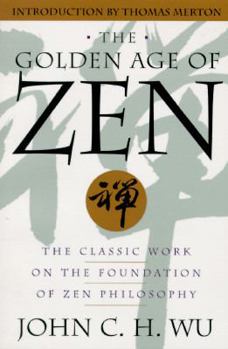The Golden Age of Zen: The Classic Work on the Foundation of Zen Philosophy
This unique edition of Hawthorne?s writing collects all five novels and a generous selection of his stories in a single paperback volume.
Format:Paperback
Language:English
ISBN:038547993X
ISBN13:9780385479936
Release Date:December 1995
Publisher:Image
Length:228 Pages
Weight:0.60 lbs.
Dimensions:0.5" x 5.5" x 8.2"
Customer Reviews
3 ratings
The real history of Zen
Published by Thriftbooks.com User , 21 years ago
This book deals with the heyday of Zen Buddhism, Tang dynasty. The purpose of this book is introducing the Westerners to the Zen Buddhism. In other word, this is a Zen primer. Zen master Suzuki¡¯s ¡®An Introduction to Zen Buddhism¡¯ is widely read for this purpose. But this book is somewhat different from Suzuki¡¯s. Just like Suzuki¡¯s book, this book follow the standard format of Zen primer. Listing koans (about the koan, see my review on Suzuki¡¯s book) chronically with the related anecdotes. But unlike Suzuki¡¯s, Wu takes the stance of interpreter not of storyteller. Storytelling is the classic way to introducing Zen Buddhism (for the reason, see my review on Suzuki¡¯s). But in that way, beginners can¡¯t grasp even the basic of Zen Buddhism. So Wu approaches somewhat differently. He begins with why Zen should take place in China, not in India. He points out the influence of Taoism. Taoism has, in fact, affinity to Buddhism and it¡¯s the mindset the Chinese understood foreign thought, Buddhism. So Wu argue that we can¡¯t figure out Zen without understanding basic principles of Taoism. Suzuki¡¯s book, for example, represents and explains the principles of Zen from the tradition of Buddhism. But unfortunately it seems not that good way to figure out Zen. Like other thoughts, Zen could be best understood against the historical backdrop. And it¡¯s the way this book employs and the beauty of this book: each principle of Zen is explained against Taoism and historical backdrop. Thought could be fully understood when the behind motives are grasped, I think. Yep, such works are not hard to see in Buddhology. But this book is written in the plain English to be steadfast to the intention of Zen primer.
THE GOLDEN AGE OF ZEN
Published by Thriftbooks.com User , 23 years ago
Wu provides a perspective of Zen which is as illuminating as Suzuki's. The additional commentary by Merton is also helpful as both he and Wu are Christians. Their Christian background provides a common jump-off point for many of us of Christian beginnings into the non-dogmatic world of Zen. At the same time our Christianity is deepened with the unmeasurable Buddha mind.Wu additionally provides a meaningful translation of the Tao te Ching.
GREAT!Perfectly flowing history of early Chinese Zen Masters
Published by Thriftbooks.com User , 28 years ago
First of all, this is a page-turner, from the Foreward by Thomas Merton, through the last page, which you hate to see arrive. It traces the early Chinese development of Ch'an, which relies on the guidance of an Enlightened Master, rather than the Japanese method of "Zazen", or "sitting quietly" (meditation), as a means of obtaining Enlightenment. Most of what we in the west know about Zen has to do with meditation, but these early founders of Ch'an saw quiet contemplation as a waste of time. A student was brought to enlightment by many methods with these Patriarchs of Ch'an. I particularly enjoyed the chapter on Chao Chou, the originator of probably the most famous Koan of all, "MU", the man was not only wise, but had a fine sense of humor too. Enlightment could also be gained via a loud shout, a door slammed on your foot, or a swift whack from your Master. You're going to have to read this to find out what the hell I'm talking about. This book will be part of your library forever, and I can guarantee it will be read many times. Also a fantastic book for those seeking the similarities of the mystical experience of all religions. BUY THIS BOOK





